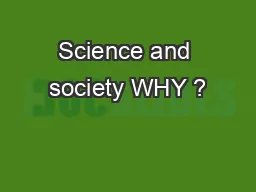PPT-Science and society WHY ?
Author : boyplay | Published Date : 2020-06-20
Just tell me what we have to know Nope This is not that kind of lesson As future citizens of a democracy your votes will decide how the nation deals with questions
Presentation Embed Code
Download Presentation
Download Presentation The PPT/PDF document "Science and society WHY ?" is the property of its rightful owner. Permission is granted to download and print the materials on this website for personal, non-commercial use only, and to display it on your personal computer provided you do not modify the materials and that you retain all copyright notices contained in the materials. By downloading content from our website, you accept the terms of this agreement.
Science and society WHY ?: Transcript
Download Rules Of Document
"Science and society WHY ?"The content belongs to its owner. You may download and print it for personal use, without modification, and keep all copyright notices. By downloading, you agree to these terms.
Related Documents













![[BOOK]-Status: Why Is It Everywhere? Why Does It Matter?: Why Is It Everywhere? Why Does](https://thumbs.docslides.com/956296/book-status-why-is-it-everywhere-why-does-it-matter-why-is-it-everywhere-why-does-it-matter.jpg)
